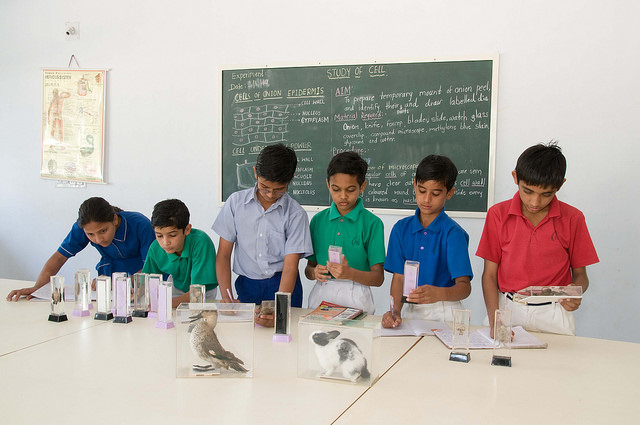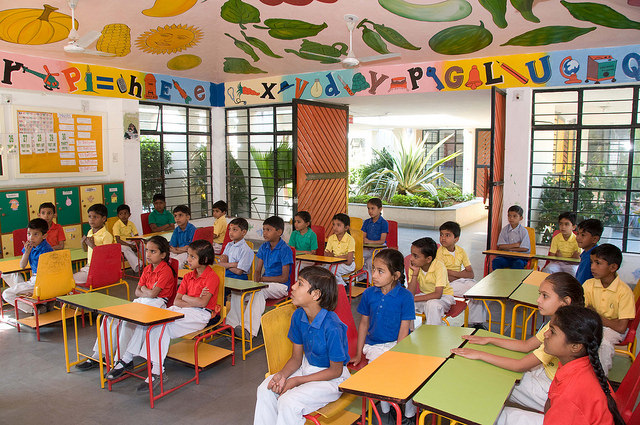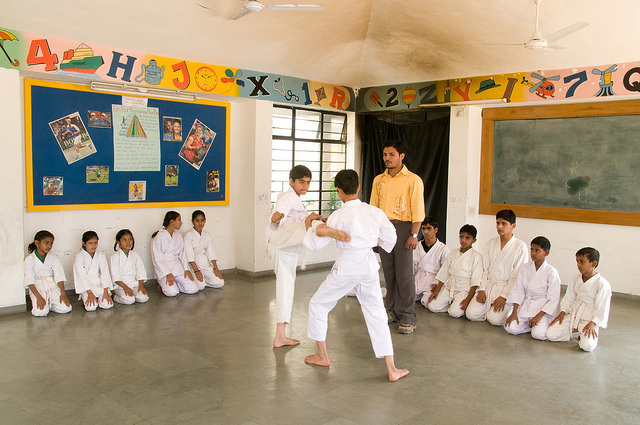From being local to going global, journey of a minority school of Gujarat
12:25AM Sun 10 May, 2015

Borsad (Gujarat): Little away from the heart of the densely populated areas, the imposing school building, amid patterned farm land from all sides, on the outskirts of this Borsad town in Gujarat is an attempt to break all stereotypes about a minority educational institution.
Away from the outside world’s Gujarati-Urdu dilemma, the students here are encouraged to speak in English. The stale unimaginative walls of an old-fashioned school have given way to colourful paintings, pictures, alphabets etc as part of the ‘Building as Learning Aid’ concept.
Welcome to the Hanifa School, Kasari, located on the Borsad-Dhuvaran road. This is a minority co-educational, Central Board of Secondary Education (CBSE) affiliated school since its inception and has strived to make a difference in quality of education being provided to its students. True to its motto - ‘Fostering the spirit of Joyful learning’ – the school has facilities on par with those provided by other top schools: well-equipped Computer, Physics, Chemistry, Biology laboratories, various recreational sports facilities and a well-endowed library.
It was the long cherished dream of businessman late Yunus Fazlani. He had his business units in Borsad and wanted to pay back to the society, to the people from where he earned wealth and name. The Hanifa School was founded in 2005 with an aim to provide quality education, especially to children belonging to lower socio economic strata of the society. The school is run under the aegis of ‘Aishabai & Haji Abdul Latief Charitable Trust’, which is being funded by Fazlani’s industrialist family with Dr Abdul Kader Fazlani as the main contributor.
“The educational institutes in Gujarat teach in Gujarati language. Then there are top schools, where children from lower strata cannot get admission due to their socio economic conditions. So Yunus sahib decided to start an English medium school with high quality education as its main motive for such students,” said Zuber Gopalani, diretor, Hanifa School and one of the main person behind accomplishing the task of establishing the school after Fazlani’s demise.
With staff strength of 49, the school caters to 650 students, mostly Muslims coming from various stratas of society. Initially in 2005, the school started with pre-primary classes; as of 2015, it caters to classes from Nursery to class 12.
Average fee structure is Rs 500 per month. There is also a provision of full scholarship for the students who are unable to pay the tuition fees.

 Colourful classroom's walls used as educational aid
Colourful classroom's walls used as educational aid

Students in a Biology lab
Going global: Thanks to the extensive use of the Internet revolution – emails and skype classes – the school has been actively participating in various international Idea Exchange programmes. “Our school participated in a British Council Project called ‘Connecting Classroom’ in 2014 in which schools from various countries took part,” Harinder Dhillon, Principal, Hanifa school, informs. Each participating school had to complete minimum seven projects with equal involvement of all the students of in which international Exchange of Ideas took place. The Hanifa School participated in exchange programmes with Egypt and Washing Well School, London through email and Skype classes. “Later, we submitted our activity portfolio to the British Council. We are intending to globalize the level of education being imparted in India using the Internet,” Dhillon says. Hanifa School has been awarded with the British Council International School Award for the efforts in strengthening the international dimension in its school curriculum. According to British Council, the International school award will be formally presented to Hanifa School in a ceremony to be held later this year. The Hanifa School has acquired the right to use International School Award (ISA) logo, kitemark for three years and plans to further strengthen the International Components in the school curriculum right from primary to secondary classes. And this has sure brought happiness for the parents, more than the students themselves. Mehboob Pathan, 50, who runs a small scale business, and has his child in the school since last nine years, says: “To have this school in a small taluka like Borsad is like a gift from Allah. Whatever my child could have learnt in the US or London, he is able to get that kind of exposure here itself in this school.” The constant and continuous efforts since 2005 are paying off, says Zuber and adds that the school is working to provide exposure and prepare younger generation to cultivate leadership abilities and play role of torchbearers. The Hanifa School’s long term plan is to render individualized education that addresses students’ unique learning styles which cultivates independent thinking, and promotes the building of character thus enabling the students to contribute to their communities in meaningful and positive way. TwoCircles












